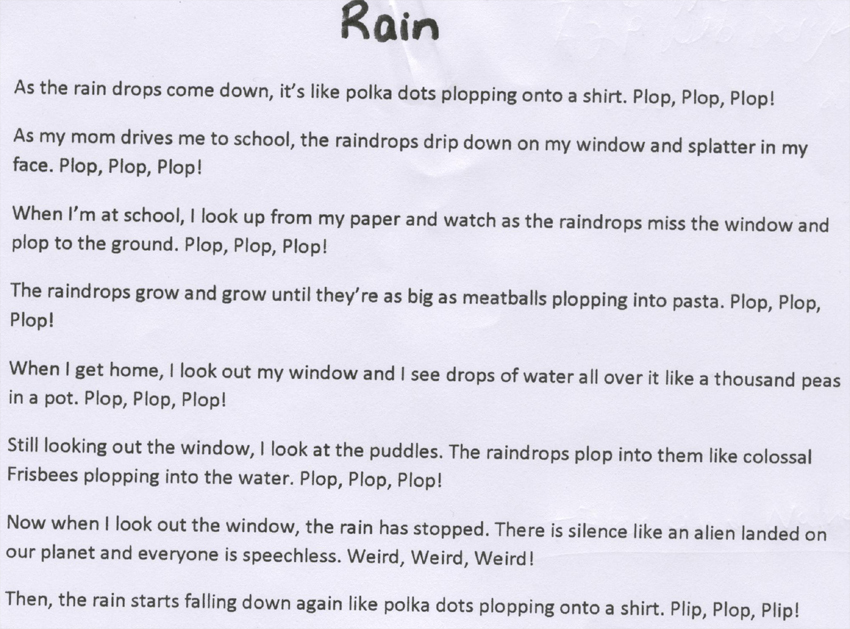2011
SARAH MOOK
POETRY PRIZE RESULTS
K-2 FIRST PLACE
Gabrielle
Kaplan
Broomall, PA
 |
|
COMMENTS FROM CONTEST JUDGE MARIE KANE: A note to all finalists: You are to be congratulated on your excellent entries to the 2011 Sarah Mook Poetry Contest. What trouble I had this year in deciding the winners! Because your work was advanced on all levels, my efforts took a longer time than usual to make the final decision. Know that your poems were read with care and attention to detail. I enjoyed every one of them! Sincerely, ------------------------------------------------------------------------------------------------ If one measure of a poem's success is that it encourages the reader to look at a common object in new and startling ways, then this first place poem for this age group is highly successful. Mostly written in couplets, the poem traces a day of looking at a rainstorm through various windows by using original similes, logical organization, and onomatopoeia. The poem begins at day's opening: "The rain drops come down, like polka dots plopping onto a shirt. Plop, Plop, Plop!" This creative simile makes the rain come visually alive. Next, the speaker is on the way to school. "As my mom drives me to school, the raindrops drip down my window and splatter in my / face. Plop, Plop, Plop!" The use of the verb "splatter" is especially notable for this age group, and the onomatopoeic "Plop . . . ," used through out the poem, gains in effectiveness by the ending. In the second section, the speaker describes the rain while at school; note the continuation of looking out a window. ". . . I look up from my paper and watch as the raindrops miss the window and / plop to the ground. Plop, Plop, Plop!" Although the word "plop" is used in every section of the poem, it is not too repetitive; its use increases the sound effect of the rain and enables the reader to actually 'hear' it fall and understand its great amount. The third section employs very creative imagery in describing the continuing rain: "The raindrops grow and grow until they're as big as meatballs plopping into pasta. Plop, Plop, / Plop!" It is this very visual and original imagery of the rainstorm that enables the reader to appreciate it more. In the next section, the speaker has arrived home and continues to experience the rain by looking out a window. Now the speaker "looks out my window and I see drops of water all over it like a thousand peas / in a pot. Plop, Plop, Plop!" The "thousand peas in a pot" is a terrific image because of its use of alliteration and visual nature. The speaker continues to "look out the window" at puddles. "The raindrops plop into them like colossal / Frisbees plopping into the water. Plop, Plop, Plop!" Here is another original image of rain drops; using "Frisbees" to describe the rain hitting puddles, not only alludes to the rain's strength, but also to the size of the rain drops. Toward the end of the poem, the rain ends. The speaker notes that "Now when I look out a window, there is silence like an alien landed on / our planet and everyone is speechless. Weird, Weird, Weird!" At this point when the speaker "look(s) out the window," the poem departs from using the word "Plop" and instead uses the word "Weird," which comments on the unnaturalness of the silence when the rain stops. Note that the speaker does not have to make a definitive statement about the intensity of the rain, since that is aptly handled in the inventive descriptions here and throughout the poem. The poem ends as it began with a similar first line. "Then the rain starts falling down again like polka dots plopping onto a shirt. Plip, Plop, Plip!" Note the change in description regarding the sound of the rain in this last line. This ending serves to reiterate and emphasize the power of the rain. After continuing all day and then ending, the rain begins again; this leads the reader to assume it will fall in the same persistent manner as described above. The
enjoyment of this poem is found in its pleasing organization that comes
full circle, original figurative language, and sound effects that facilitate
the reader's experience of an all-day rainstorm. Thank you for the privilege of reading your work. Marie
Kane |